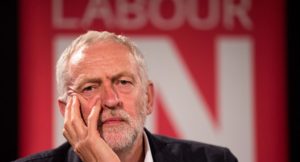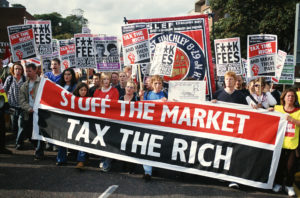Jeremy Corbyn has described Keir Starmer’s decision to stop him standing as a Labour candidate in Islington North as a “flagrant attack” on democracy. Such pique is understandable, perhaps, since Starmer claimed to be “100% behind Jeremy Corbyn” when the allegations of the former leader’s antisemitism were circulating in 2019. All the more so when you take into account Starmer’s reneging on his pledge to allow local party control over parliamentary selections.
But it’s not unusual for a Labour leader to attempt to define himself against a predecessor and make a decisive break with the past. Sometimes the differentiation is gained through dint of personality, as with the war-hero Clement Attlee who contrasted starkly with his pacifist predecessor George Lansbury. And the grammar-school boy Harold Wilson, who was a clean break from his aloof public-school predecessor, Hugh Gaitskell. Sometimes it is a deliberate political ploy: Tony Blair conjured Michael Foot to condemn the lack of professionalism that characterised “Old Labour”. Corbyn, himself, was elected leader in part as a repudiation of the kind of political triangulation that defined the New Labour years.
No post-war Labour leader has gone so far as Starmer, though, and attempted to block his predecessor from standing for election. Plenty of big-hitters have been expelled from the party – in circumstances which may have resonance for Corbyn. In 2000, for example, Ken Livingstone, who served as the legendary leader of the Greater London Council in the Eighties and then as a Labour MP for 13 years, was explosively ejected from the party when he dared to stand for Mayor of London against the wishes of Tony Blair. This backfired when Livingstone then stood as an independent and decisively defeated Blair’s handpicked candidate, Frank Dobson, who secured just 13% of the vote. Might Corbyn seek to follow Livingstone’s example as he considers his own options in his Islington North constituency?
Michael Foot, too, provides a blueprint of sorts. Twenty years before he became Labour party leader, he and three other Labour MPs lost the whip, though, like Corbyn, maintained party membership.
“Even if they expel me,” Foot declared on the eve of the decision, “I shall still go on supporting the Labour Party”. In this, Corbyn has followed Foot’s example, loyally supporting Labour candidates and canvassing with his local party in Islington. When it was proposed that losing the whip meant that Foot should also be stripped of his party membership, Foot’s ally Harold Wilson declared that such a suggestion was “plain daft”. When the Right-wing leader, Hugh Gaitskell, was replaced by Wilson two years later, the whip was restored and Foot’s political career resurrected.
Such temporary purges are not unusual. In 1939, Nye Bevan and Stafford Cripps were among those booted out of the party for advocating a Popular Front to combat fascism. These expulsions were generally unpopular, with many local Labour constituency parties issuing statements of support for the condemned. Nine months later, they were readmitted to the fold. Cripps would go on to serve as Chancellor in the Attlee Labour government, and Bevan founded the National Health Service.
But in the cases of Foot, Bevan, and Cripps, these expulsions came relatively early in their careers, as a kind of rite of passage, burnishing Left-wing credentials before entering the party establishment. To find an example of a Labour leader being expelled after rising to the top of the party, we must travel back to the interwar period and the travails of Labour’s first prime minister, Ramsay MacDonald.
In August 1931, there was a run on the pound. MacDonald told his Cabinet that severe public spending cuts would be required in order to restore confidence in the markets. These cuts were highly controversial within the Labour Party. Many Labour MPs felt that the poor had suffered enough during the depths of the Great Depression. On Sunday, 23 August 1931, the Labour Cabinet clashed for four hours over the proposals, with MacDonald ultimately failing to win over his colleagues.
That evening, a melancholy MacDonald met with King George V to keep him informed of the situation, anticipating the end of his premiership. He returned to the palace the next morning, to convey his resignation and those of his ministers. Given that Parliament was “hung”, it was expected that the King would ask Conservative leader Stanley Baldwin to try to form a new government. Yet, to almost universal astonishment, MacDonald returned to announce that George V had asked him to stay on as prime minister to form a National Government with the support of the Conservatives and Liberals.
A month later, the Parliamentary Labour Party (PLP) voted to expel MacDonald and all those MPs who collaborated with him in the formation of the National Government, including the Chancellor of the Exchequer Philip Snowden. Their names became bywords for treachery in the lore of the Labour Party. The historian John Shepherd reflected: “No 20th-century party leader has been more hated than Ramsay MacDonald.”
Yet, it is worth noting that MacDonald’s successor, Arthur Henderson, felt enormous heartache over what had happened. Henderson had no love for MacDonald personally: the two barely on speaking terms even when he served as MacDonald’s Foreign Secretary. Yet, the act of expelling someone who had devoted decades of service to the party did not give Henderson any joy. Indeed, Henderson couldn’t bring himself to sign the notice of expulsion, using a rubber stamp instead. If Starmer is required to sign a similar form deciding the fate of his predecessor, Jeremy Corbyn, we can guess that his hand will waver less than Henderson’s did.
The Labour Party is a “broad church”, a necessity for the party under a First Past the Post Electoral system. While it contains, as Peter Shore once said, the title deeds to parliamentary socialism in Britain, there have always been different interpretations and traditions of Left-wing thought within the party. Historically, its leaders recognised this diversity of thought as one of Labour’s great strengths. Harold Wilson said that the Labour Party needed both its Left and Right wings to fly.
Keir Starmer appears to be less ecumenical. For him, the Labour Party requires strict orthodoxy, where dissenting traditions are not allowed. He has used the longlisting powers of the NEC, which has a pro-Starmer majority, to block any parliamentary candidates who show a whiff of disloyalty to the leader.
The Labour Party may have the wind at its sails in the polls now, but the Starmer project has left it without a very deep keel. The party will be weaker if his legacy in the Parliamentary Labour Party is to produce a cadre of similarly (and, therefore, narrowly) minded MPs, whose defining feature is their loyalty to him. In the short-term, blocking Jeremy Corbyn’s re-selection enables Starmer to achieve a decisive break with the recent past, but the longer-term ramifications could be less salutary.
Disclaimer
Some of the posts we share are controversial and we do not necessarily agree with them in the whole extend. Sometimes we agree with the content or part of it but we do not agree with the narration or language. Nevertheless we find them somehow interesting, valuable and/or informative or we share them, because we strongly believe in freedom of speech, free press and journalism. We strongly encourage you to have a critical approach to all the content, do your own research and analysis to build your own opinion.
We would be glad to have your feedback.
Source: UnHerd Read the original article here: https://unherd.com/





